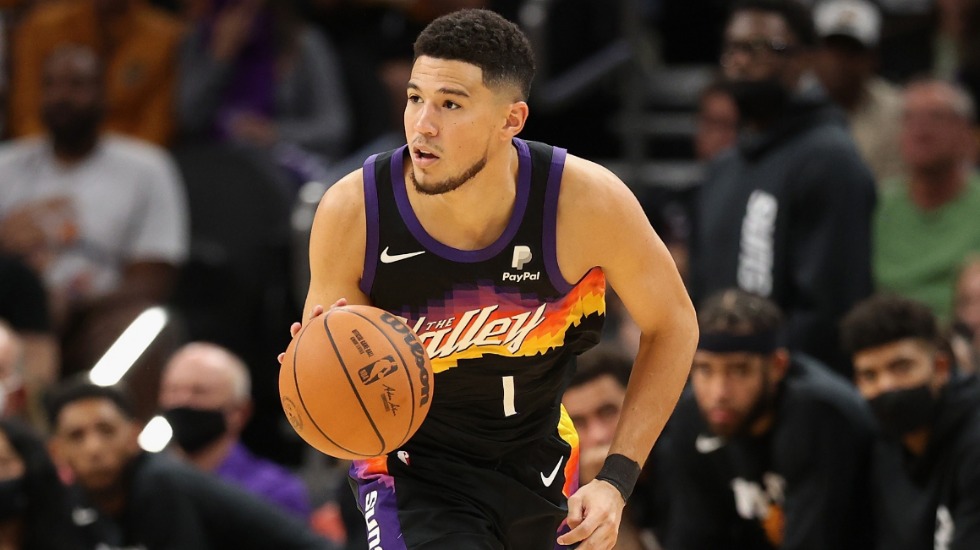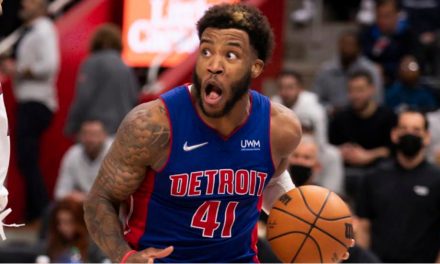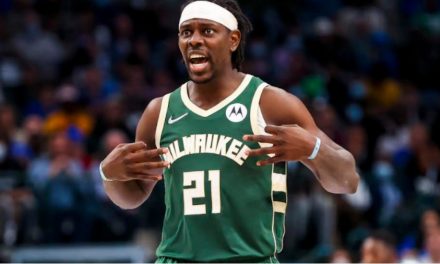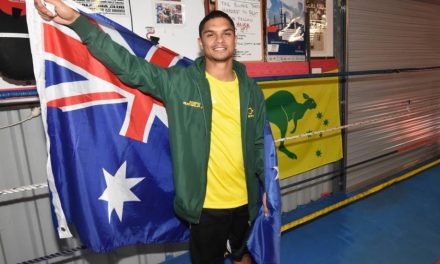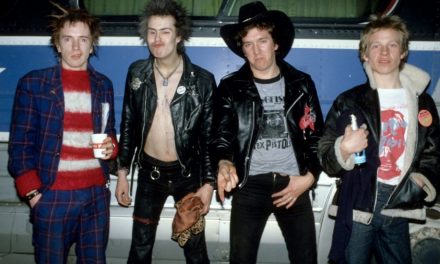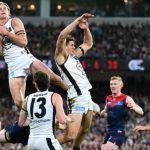Even without Devin Booker (pictured) for most of the match, Phoenix still managed to defeat league-leading Golden State this week. Photo: Getty Images
The Phoenix Suns are currently on a franchise record-tying 17-game winning streak after beginning the season 1-3.
And after they took down the Golden State Warriors on Wednesday (Australian time) to move into a tie with those same ‘Dubs’ for the best record in the league at 18-3, despite losing leading scorer Devin Booker to an injury in the first half, it begs the question: are the Suns the league’s benchmark?
There are certainly arguments against it: the Nets haven’t had their full team together; the Bucks have missed key personnel; Nuggets players are dropping like flies.
Phoenix has also enjoyed one of the softer schedules in the league as per Tankathon and has been fortunate enough to encounter teams with key personnel missing.
On current form, though, it’s hard to argue against the Suns being the best of the best in the NBA.
So how are they doing it?
Culture
Love him or loathe him, Chris Paul brings a certain attitude to his teams. Notoriously prickly and a noted perfectionist, Paul is seemingly never satisfied. He fumes at players who cannot, or will not, meet his lofty standards.
In Devin Booker he’s found a kindred spirit.
In just a tick over 12 months, the two All-Stars have developed a level of chemistry both on and off the court that often takes years to develop.
With their leadership, the Phoenix locker room, traditionally a less-than-ideal workplace (away from basketball, it appears the Suns organisation is still very much a less-than-ideal workplace), has become a beacon of respect and accountability.
As Paul told ESPN’s Brian Windhorst, “We’ve got a great group, a great locker room. I’ve never seen anything like it. It’s about accountability. If you’re not doing the right stuff, you’re going to stick out.”
For his part, coach Monty Williams has praised the collective mentality of the group to prove that last season’s surprise run to the Finals wasn’t a fluke, which has helped ease any of the tetchiness that existed even last season.
With a championship ever so close, the Suns have coalesced behind their two superstars and a coach who knows more than most about overcoming adversity.
Balanced offence
When you look at the best teams in the NBA, there are always two or three genuine superstars on the roster.
But within that tier there remains a clear pecking order. Kevin Durant is the main man in Brooklyn; Steph Curry remains the most influential offensive player in the game; Giannis Antetokounmpo is the Bucks’ Alpha; Nikola Jokic is the centre of the Nuggets’ universe; LeBron is always the key player on any team he plays on.
Ask yourself this: who is the Suns’ best player?
If we ran a poll on this page, this writer would wager significant currency that the margin between Paul and Booker – the two clear choices – would be startlingly thin.
Phoenix’s All-Star back court undoubtedly makes this team tick. Booker, with 23.2 points per game, leads the team in scoring but is quite a way behind those mentioned above in pure point production.
Whilst those other five are all inside the top eight in scoring, Booker checks in at a relatively lowly 18th in the league. Despite not possessing a single dominant scorer, the Suns’ offence is rated seventh in the NBA per 100 possessions.
A large reason for that is Paul. The ageing maestro is a perfect running mate for Booker who, despite his reputation, is more mid-range assassin than three-point bomber.
Paul’s preferred deliberate pace of play also meshes perfectly with Booker’s methodical, probing tendencies. At age 36 and in the midst of his 17th campaign, Paul is still putting up double-figure assists and scoring in the mid-teens.
The rest of the rotation play their individual roles in the offence to perfection.
Deandre Ayton has been convinced (there’s that team culture again) to eschew his own offensive touches for the good of the group, instead doing all the dirty work in rolling hard to the bucket and hitting the offensive glass to get his 16 points per night.
Mikal Bridges – more on him below – fills whatever gap is necessary, spacing the floor and firing from deep (connecting at 39.1 per cent) or acting as a hard-cutting dive man.
The Suns currently boast six players averaging double figures in points per game (though that number was boosted by JaVale McGee and Frank Kaminsky stepping up in Ayton’s injury absence in November) with another three sitting around a point off that mark. That’s a remarkably balanced attack.
At the top end, if you hold Booker, Paul or Ayton could erupt. At the bottom end, you could get killed by a hot-shooting night from any of Bridges, Jae Crowder, Landry Shamet or Cam Payne.
PLEASE HELP US CONTINUE TO THRIVE BY BECOMING AN OFFICIAL FOOTYOLOGY PATRON. JUST CLICK THIS LINK.
Stifling defence
The main man at the defensive end of the floor for Phoenix is undoubtedly Bridges. Drafted at No.10 in the same year Ayton went first overall, Bridges is putting forward a sneaky Defensive Player of the Year case.
The box score numbers – 3.9 rebounds, 1.5 steals, 0.6 blocks – don’t come close to doing justice to Bridges’ lockdown defence.
Instead, look at the shooting numbers of the men he’s assigned to. In just his last three contests he’s forced Curry into a 4-21 shooting performance, James Harden into a 4-15 night and Julius Randle into shooting 3-8 (the number of attempts Randle took proving telling).
If you must have some stats, here’s a doozy that proves Bridges’ two-way worth: per Second Spectrum only two players in the league are posting a better-than-60-per-cent true shooting percentage while limiting their one-on-one match ups to a sub-40 field goal percentage (minimum 30 minutes per game; minimum 10 FGA defended): Bridges and Rudy Gobert. One of those men has three DPOYs on his mantle. The other is a sneaky chance to earn his first.
Despite his age, Paul uses a combination of elite hands, ridiculous basketball IQ and some old-fashioned nastiness to rake in 2.1 steals a night, on course to be his best season in that facet of the game since 2014. He remains a superb positional defender despite his diminished speed.
Ayton came into the league with all the tools to be a solid defender, but precisely none of the know-how. As a rookie he was about as resilient as smoke as people seemed to pass straight through him on their way to the hoop.
Now into his fourth year as a pro, Ayton has become a very good defender, able to protect the rim, clean up on the boards and stay with smaller men in switches.
Suns coach Williams has always preached defence above all else. So far this season, he has his Suns coming in at third in the NBA in defensive rating, joining the Warriors, Jazz and the surprising Bulls as the only teams to enjoy both a top-10 offence and defence.
Make no mistake, the Suns have some exceptional defensive players on their roster, but credit must go to Williams for finding ways to get Booker, Shamet, McGee, Payne and even Kaminsky to look like competent defensive players.
Clutch play
Statement: Chris Paul has always been clutch.
Even dating back to his time at Wake Forest, Paul was the man with the ball as the game was on the line, methodically picking apart defences, getting to his preferred spots and draining rainbow jumpers over much, much bigger bodies.
With the Clippers he made numerous big shots. He almost led the Rockets to the Finals before his hamstring gave out. He got a tune out of what was supposed to be a moribund Thunder outfit by becoming the NBA’s very best clutch player.
This season, Phoenix is an astonishing 9-1 in clutch situations (defined as a game where the margin is within five points in the final five minutes of regulation) with Booker and Paul ranked one and two in offensive rating in clutch minutes. Remarkably, Crowder ranks fifth and Bridges sixth.
Booker is shooting a ridiculous 73 per cent from the floor and 60 per cent from beyond the arc in clutch situations. For his part, Paul is shooting at 64 per cent from the floor, 95 per cent from the free-throw line and running at a barely believable 5.2:1 assist to turnover ratio.
Coaches can be guilty of overcoaching in these situations. Williams is wise enough to let his star men take the lead, saying, “They have been clutch players all their lives.”
Rather, he studies the tendencies of Booker and Paul, coaching the players around them – usually Bridges, Ayton and Crowder with a hint of Shamet thrown in – as to how best fit in around their tentpole stars.
In a win against the Hawks in early November, the pair combined for 16 points in the clutch. Two nights later in Sacramento, Paul threw an alley-oop to McGee to take a late lead, then buried the game-sealing free throws. A week later against the surprisingly fun-to-watch Timberwolves, Booker hit a pair of late jumpers before Paul’s free throws secured victory.
It’s obvious that Paul and Booker trust their judgement and that in turn their teammates and coaches trust them to make the right calls.
All in all, that combination of two-way play, clutch brilliance and a focused locker room make the Suns the form team of the league.
To find more of Jarrod Prosser’s content visit vendettasportsmedia.com

